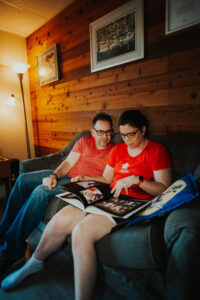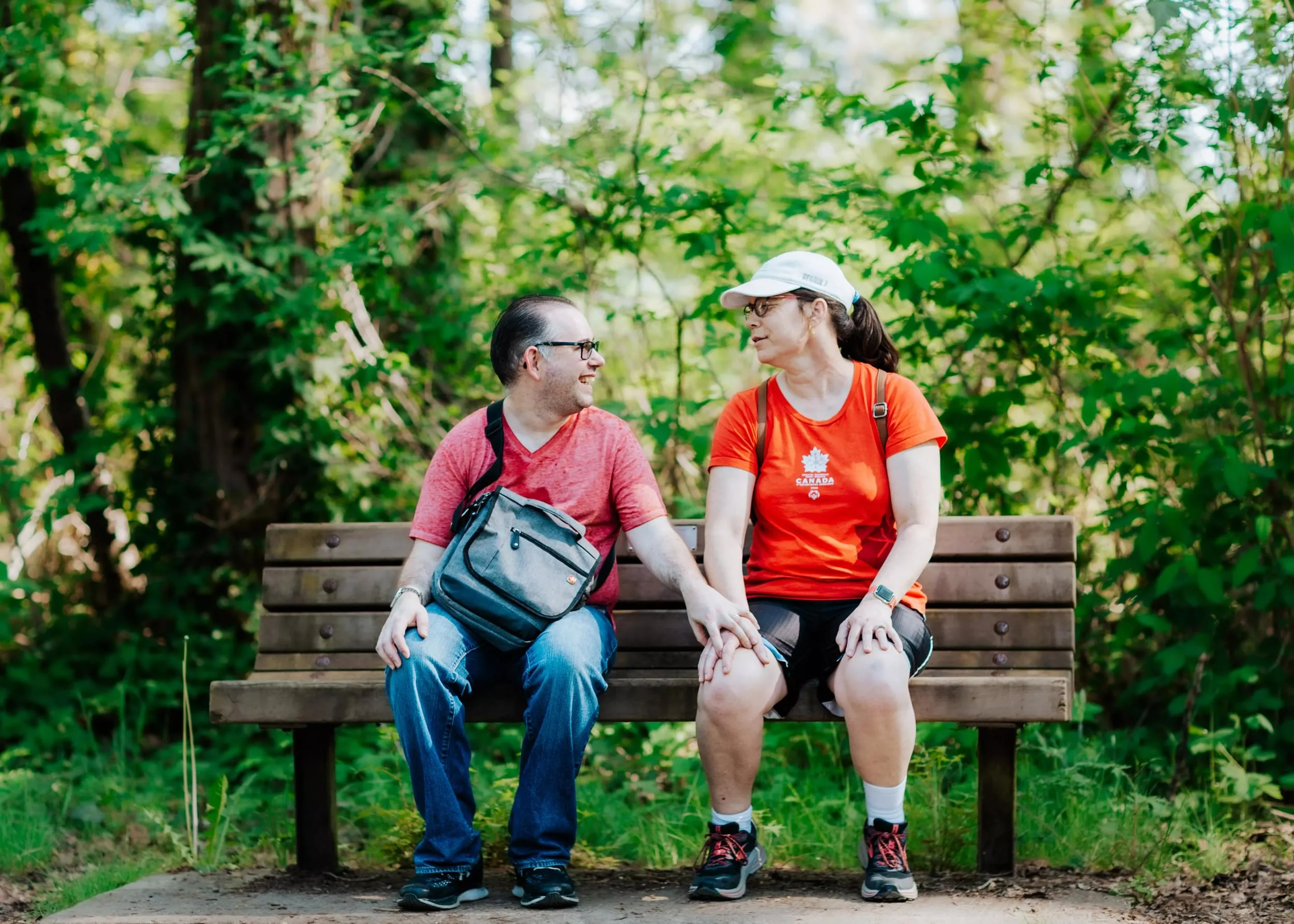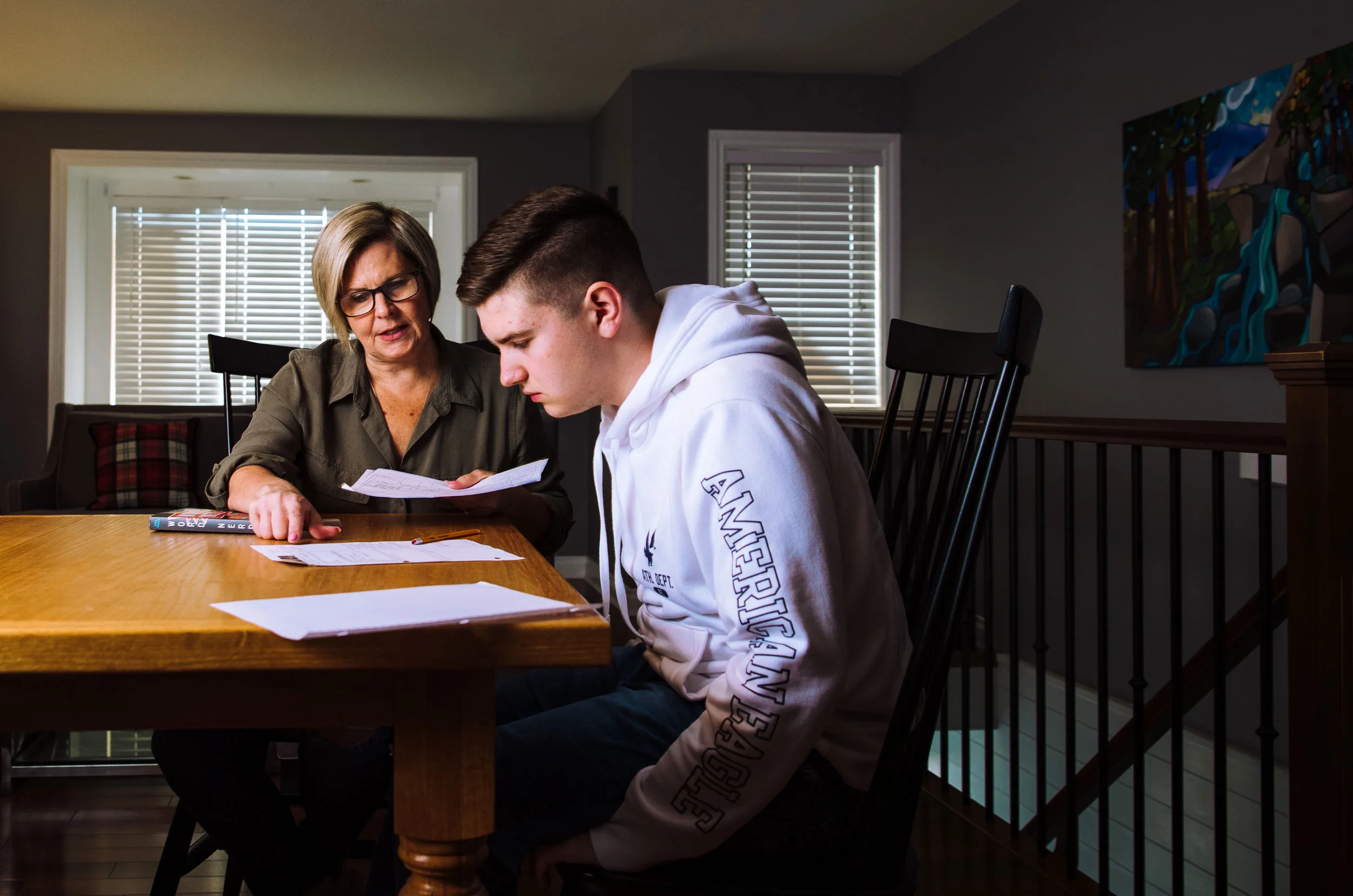
“I could have thrown in the towel many times…but something told me that this was definitely worth my time.”
 Brent and Fiona Hall sit on a plush couch in the living room of their basement suite overlooking the Burrard Inlet in Port Moody. There are watercolour paintings hanging on their walls alongside photos of their 2009 wedding, a plaque from Brent’s employer, and medals that Fiona has won in countless competitions as a Special Olympics athlete. The two are very different – Fiona is fit and competitive, a woman of few words who lives to be on a bike, skis or her family’s sailboat, and Brent is a talkative self-described computer nerd who works at a large tech retailer named after a fruit (he informed us that they are very strict about being named in print).
Brent and Fiona Hall sit on a plush couch in the living room of their basement suite overlooking the Burrard Inlet in Port Moody. There are watercolour paintings hanging on their walls alongside photos of their 2009 wedding, a plaque from Brent’s employer, and medals that Fiona has won in countless competitions as a Special Olympics athlete. The two are very different – Fiona is fit and competitive, a woman of few words who lives to be on a bike, skis or her family’s sailboat, and Brent is a talkative self-described computer nerd who works at a large tech retailer named after a fruit (he informed us that they are very strict about being named in print).
I ask how the two of them met, and Brent starts to tell a vague story about the two of them having mutual friends when Fiona interrupts him loudly: “Tell the truth!” she demands jokingly, in that particular tone wielded by a spouse who has heard their partner embellish an anecdote too many times over the years. Brent laughs sheepishly and rolls his eyes. “Ok,” he says with a wry smile, “we met at a party at my ex-girlfriend’s house” That party, he says, came and went, and he saw her at the mall a few times, “and then I saw her at a job agency where I was looking for my first part time job. I saw Fiona sitting there, waiting for her appointment, and Fiona will tell you, all she did was just say hi to me” That was enough for Brent to muster up the courage to go talk to her, a decision that changed both of their lives. As Brent recounts, “[Fiona] will always say to me, ‘you’re the one that came up to me, it’s all your fault! We’re here together today because you walked up to me, not the other way around’ and she makes that quite clear”
 As Fiona tells it, she wasn’t really looking for love when she first met Brent. Besides, he wasn’t really her type anyways. She was looking for someone with similar interests: “I wanted someone who could ski with me, bike with me, and whatever. But, that didn’t happen [so] I made him learn to ski” Brent laughs as she talks about her skiing ultimatum, and talks about it like a challenge he valiantly, if at times reluctantly, took on to win the girl of his dreams: “She’s a gold medal skier, and I had no idea how to ski…and she said ‘you’re gonna learn how to ski. I’m going to put you in this program and you’re going to do this every year for 5 weeks until you learn to ski independently.” A mischievous smile creeps across his face, and he continues, “Little did she know, she did this program for more than five years, and I learned to ski and got my certificate in two years!” To this, Fiona interjects playfully, “Be quiet!”
As Fiona tells it, she wasn’t really looking for love when she first met Brent. Besides, he wasn’t really her type anyways. She was looking for someone with similar interests: “I wanted someone who could ski with me, bike with me, and whatever. But, that didn’t happen [so] I made him learn to ski” Brent laughs as she talks about her skiing ultimatum, and talks about it like a challenge he valiantly, if at times reluctantly, took on to win the girl of his dreams: “She’s a gold medal skier, and I had no idea how to ski…and she said ‘you’re gonna learn how to ski. I’m going to put you in this program and you’re going to do this every year for 5 weeks until you learn to ski independently.” A mischievous smile creeps across his face, and he continues, “Little did she know, she did this program for more than five years, and I learned to ski and got my certificate in two years!” To this, Fiona interjects playfully, “Be quiet!”
Fiona and Brent’s story is unfortunately remarkable. People with intellectual and developmental disabilities often don’t receive much guidance or education around relationships and sexuality. Parents or other family members may be hesitant to broach the subject because of their own discomfort or fears that their loved one may be at risk. Caregivers and staff in community living may avoid the subject, thinking it’s not their job or that by discussing it openly they may be opening a Pandora’s box that can’t be closed. It’s been common practice to exclude people with disabilities from the sex education provided in schools, and there is a persistent assumption that this is a population that isn’t ready or able to have romantic relationships. As adults, there is not a lot of support available for people to explore their desires and preferences, to engage in the trying (and yes, failing) and learning that many of us take for granted in our own romantic lives.
These two attribute the longevity of their relationship to the support they’ve received from their friends and families. As Brent recalls, “it was really nice meeting Fiona and her family and being welcomed. It wasn’t just our relationship, but also my relationship with her parents that’s helped. Going out for dinner with them every Friday, watching them play curling, and going out for dinner and going home at 11:30 with a stuffed belly.”
When their relationship hit a rocky patch early on, and Fiona decided she needed a break, Brent met with her parents and talked though some of the difficulties they’d been having: “[I] met with her mom and had some some discussions with her…it was my problem, learning patience, learning that Fiona needs this and this, and needs that support, and I need to cool my engines! I think there was too much testosterone going on at that time, but between her mom and [our friends], they saved our relationship…I don’t think we would be together now if it wasn’t for our really good friends just supporting us”
When asked what they think would help support people with disabilities explore and achieve their romantic goals, Brent and Fiona said they wished there were more accessible dating apps and events that took their access needs into account.
Brent also had advice for people who are looking for love or in the early stages of a relationship: “Don’t have an agenda; I think people get it in their heads…you have to progress your relationship in a certain way, and it’s all in their minds. Get out of your head and just do it already! I have anxiety and if I think about things too much…I will worry, and that worry turns to fear and that fear’s going to take over”
If you or someone you know is looking for support with dating, relationships and sexuality, visit our colleagues at Real Talk for videos, events, resources and learning opportunities.
Did you enjoy this story? Do you know someone who you think we should profile in a future Challenging Misconceptions feature? We want to hear from you! Get in touch with Galen Exo at gexo@inclusionbc to tell us about a story that moves you.
Written and photographed by Galen Exo
Do you enjoy real life stories about inclusion? This article was featured in the latest edition of our monthly newsletter, Inclusion in Action. Subscribe today to receive regular updates with stories like this.
This article is part of our Challenging Misconceptions project.
Definitions:
- To embellish means to change a fact or story.
- An anecdote is a short story that someone tells in conversation.
- To broach a subject means to talk about it, maybe for the first time.
- Pandora’s box refers to a story about a woman who opens a box with something very powerful and scary inside. It means to do something that can’t be undone.
- Persistent means something that happens a lot and is hard to change.


